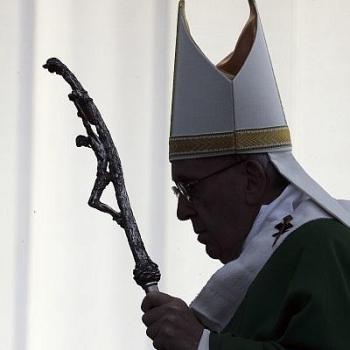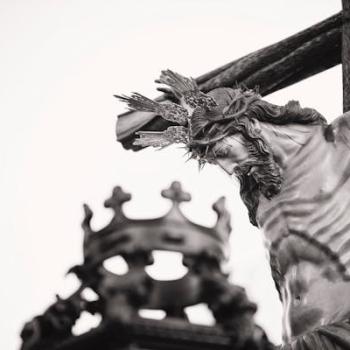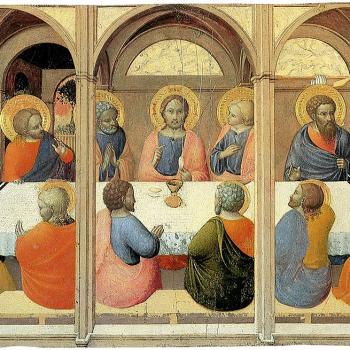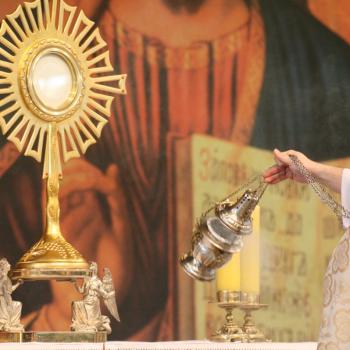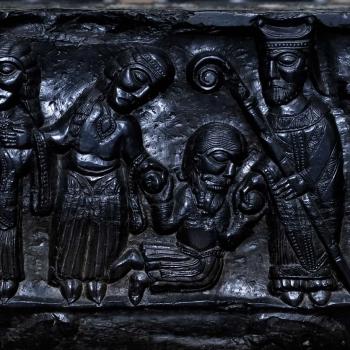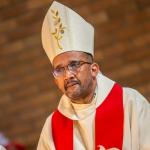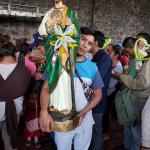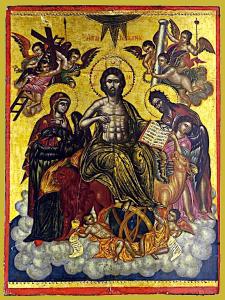
Jesus said he came to help the poor, to heal those suffering from all kinds of diseases and physical ailments, indeed, to liberate the oppressed from their oppression. He made this clear when he read from Isaiah and said that the words of the prophet were fulfilled by him, experienced by those in his presence:
“The Spirit of the Lord is upon me, because he has anointed me to preach good news to the poor. He has sent me to proclaim release to the captives and recovering of sight to the blind, to set at liberty those who are oppressed, to proclaim the acceptable year of the Lord.” And he closed the book, and gave it back to the attendant, and sat down; and the eyes of all in the synagogue were fixed on him. And he began to say to them, “Today this scripture has been fulfilled in your hearing.” (Lk. 4:18-12 RSV).
Jesus is, to be sure, the God-man, and it is as the God-man that he fulfills the words of Isaiah in and through his presence. That is, his presence offers healing grace to those who encounter it, providing people the means to overcome the greatest oppression of all, sin. Not only does he forgive sin, but he also counters the structures of sin in the world, freeing people from the harm which sin has caused.
In Jesus we have the immanent eschaton. In him, therefore, the eschaton is realized, and he brings that realization to the world, allowing those within time to participate in it even as they continue their own journey to the eschaton themselves (which is why, paradoxically, the eschaton is said to be already and not yet). In him and through him, we are able to participate in the eschaton for ourselves, that is, in the kingdom of God. In Jesus, we see the end of sin, the end, then, of all the harm which sin has caused in time, because we see sin has no place in the eschaton; sin, and the harm it has caused, is overcome the work of the incarnation. The kingdom of God is experienced in part because we still find ourselves in time; we have not come to our own temporal end, for it is only when we come to it that we will find that our end joins in with and is brought into the end of all ends, the eschaton. Nonetheless, the experience of the eschaton that we can have now brings grace us, grace which is not to be selfishly used and kept to ourselves, but shared with others. The more we partake of it, the more we expected to become like Jesus and share grace with the world, doing our part to heal it from the ravages of sin. We are to come to the aid of those who are unjustly burdened in the world, liberate those who are held by the bondage of oppression, and heal all those who suffer pain and sorrow. We are to remove the structures of sin from the world, using the grace we have to replace them with structures of justice and charity. We are to care for others, showing them God’s love in and through our actions.
Thus, like Jesus, we are to proclaim the acceptable year of the Lord. We are to proclaim to the world the better way of life revealed by the incarnate God-man. We are expected to share in the work of Jesus, continuing in time the fulfillment of Isaiah’s prophecy. We do this by becoming one with the God-man, that is, in and through our reception of communion. When we partake of the eucharist, the God-man enters us in order to transform us into his body, and in this fashion, we are to be his continuing presence in the world, the presence which sets the oppressed free.
The eucharist is given to us to take and eat so that we can become what we eat. Jesus said take and eat, and that is what we should do, take and eat. Christ becomes a part us, even as we then become a part of Christ. Thus, it can be said, the transformation which begins with bread and wine and continues in and with us, so that we, like the bread and wine, become Christ:
This partaking in the body and blood of Christ means nothing else than that we should pass over into what we have taken in. Since we have died with him and are buried with him and are risen with him, let us bear him through all things both in spirit and in flesh, as the Apostle says: “You have died, and your life is hidden with Christ in God. When Christ your life appears, however, you too will appear with him in glory,” who lives and reigns with the Father and the Holy Spirit forever and ever. Amen. [1]
A proper eucharistic spirituality will have us reflect upon what it means to be transformed into Christ. It is no good to merely look up to the eucharist and bow before it if we do not partake of Christ ourselves, if we do not let Christ transform us into his body so that we can continue the work which he began in his earthly ministry. It does little to no good to say pious things about the eucharist if we treat it like a talisman or an idol, ignoring that Jesus said that we should take it and eat of it so that we can become one with him. A eucharistic revival should be about proclaiming the way Christians are to become the body of Christ in the world, taking up and speaking up for the oppressed, to those who are dehumanized and abused, especially by their fellow Christians. If this is the focus, then those who partake of the eucharist will be able to understand what it means for them, for then they will realize all things they do should be transformed in light of the eucharist:
Work, economic life, the family, art, technology, politics and cultural life all become part of man’s eucharistic relationship with God. Within the eucharist, man, the world and history find their true identity and at the same time are made word: they appear “according to nature” as the Word and Wisdom of God, as the blessed Kingdom of the Father and of the Son and of the Holy Spirit. [2]
We are to become the presence of Christ in the world. We are to do as he did. We are to live and work in the world with a spirit of self-giving love. When we do that, we will see that our love will have us join in with others, for that love will form a bond of unity, and so, we will counter the way of sin and the division which sin brings into the world. Sin disrupts and destroys unity, encouraging people to be separate individuals looking after themselves, while the eucharist teaches us that such individualism is false, that we are to be united together in a communion of love. We are to do what we can to expand such communion, hoping that all can be brought into it so that all can share in the glory of the kingdom of God. Using the eucharist to encourage division disrupts the purpose of the eucharist, and all attempts of revival founded upon such a principle would therefore be sacrilegious as it reinforces the sin of individualism instead of the communion which the eucharist is about:
Within the eucharist, partaking of daily nourishment is to partake in Christ’s sacrifice, to partake in that death of individual demands and claims which raises life up into the miracle of communion. The bread and wine of the eucharist are the body and blood of Christ, the reality of His theanthropic nature – a participation and communion in His mode of existence. It is the first-fruits or leaven of life, for the transfiguration of every facet, every activity in human life into an opportunity for communion and an event of communion. [3]
Is there any wonder why so many are confused about communion, about the eucharist, when it has been elevated and turned into a tool of radical individualism, reinforced with the notion that its primary purpose is not the self-giving gift of God for us to receive and be transformed into the body of Christ, but for God to be lifted up and adored in a way which God is kept separate from us? The incarnate God-man is God-with us; the eucharist is God-with us. We are meant to partake of it. We are meant to be transformed by it so that humanity can see God remains active in the world in and through us. But that is not what they see. They see selfish people keeping the eucharist to themselves. They see arguments about how the transformation of bread and wine is to be had so that the eucharist is truly Christ, but they do not see any discussion, or treatment, of the fulfillment of the eucharist is our own transformation into the body of Christ. The miracle which began with the epiclesis is meant to continue in and with us, and through us, to the whole world. Since we have stifled that transformation in us, is there any wonder why they doubt the transformation of the bread and wine? If we want people to believe, we must do our part, and welcome the transformation within. We must let ourselves be transformed so that we can then bring the presence of the God-man to the world with us, allowing the fulfillment of the words of Isaiah to continue until the end of time. Then, if others can see the work of God in the world through us, and see it was done in and through our own transformation, they will truly have a reason to believe.
[1] St Leo the Great, Sermons. Trans. Jane Patricia Freeland CSJB and Agnes Josephine Conway SSJ (Washington, DC: CUA Press, 1996), 277 [Sermon 63].
[2] Christos Yannaras, The Freedom of Morality. Trans. Elizabeth Briere (Crestwood, NY: St. Vladimir’s Seminary Press, 1984), 94.
[3] Christos Yannaras, The Freedom of Morality, 217.
Stay in touch! Like A Little Bit of Nothing on Facebook.
If you liked what you read, please consider sharing it with your friends and family!
N.B.: While I read comments to moderate them, I rarely respond to them. If I don’t respond to your comment directly, don’t assume I am unthankful for it. I appreciate it. But I want readers to feel free to ask questions, and hopefully, dialogue with each other. I have shared what I wanted to say, though some responses will get a brief reply by me, or, if I find it interesting and something I can engage fully, as the foundation for another post. I have had many posts inspired or improved upon thanks to my readers.






